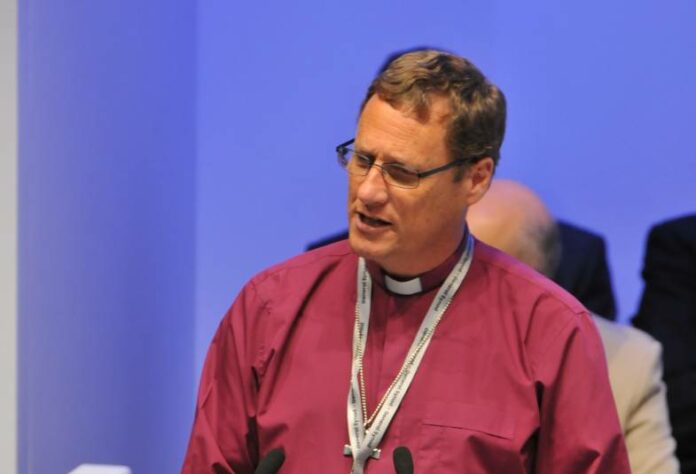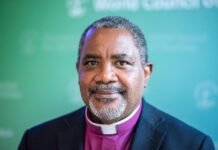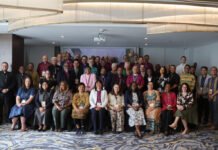The Church of England’s General Synod has given agreement in principle to taking forward outline proposals for the wider use of prayers asking for God’s blessing for same-sex couples in church services.Sam Atkins/Church of England
Synod members supported a motion signalling approval for a broad package of proposals designed to help hold the Church together amid deep disagreements over questions of sexuality.
A selection of readings and prayers of thanksgiving, dedication and asking for God’s blessing for same-sex couples – known as Prayers of Love and Faith, are already in use as part of regular services in some churches such as a Sunday eucharist or evensong.
The package of proposals includes possible arrangements for the use of the Prayers of Love and Faith in special – or standalone – services alongside delegated episcopal ministry and work to provide a timetable towards a decision on clergy in same-sex civil marriages.
Speaking in the debate, the Archbishop of York, Stephen Cottrell, acknowledged there are deep disagreements within the Church on questions of sexuality and that the proposals would not fully satisfy any group – but represented an “Anglican way forward”.
“What’s before us is a compromise,” he said.
“No parish, no priest has to offer these prayers but once the detail has been worked out – not yet done, we’re still on a journey – standalone service can take place and [for] those who for reasons of conscience and theological conviction cannot support this, delegated and extended episcopal ministry for pastoral care, sacramental care and teaching ministry will be put in place.
“What’s before us isn’t what everyone wants …. but it is an Anglican way forward.”
The Archbishop of Canterbury, Justin Welby, said he owes much in his own journey of faith to people from different traditions who take opposing views on questions of sexuality.
He singled out both the Alliance network of church leaders, which takes a conservative stance, and the Together network, which takes a progressive position, and said he could not imagine the Church without either of them.
“They all deepened my love for God,” he said.
“That they flourish is indispensable to the gospel in this land.”
He continued: “I cannot imagine the Church of England without any particular group within it, and without her reaching effectively to anyone outside it through inclusion and justice, lived in holy imitation of Christ.
“That the church flourishes as one is indispensable to the gospel in this land.”
Opening the debate the Bishop of Leicester, Martyn Snow, the lead bishop for the Church of England’s Living in Love and Faith process, recognised that people on opposing sides of the argument about moves to recognise same-sex couples “want the best for the Church”.
“We all want the best – and yet we profoundly disagree, he said.
“So what now?
“Well maybe, just maybe, for a short period, we all have to settle for second best, and trust that, though this might grieve God, God still delights in us God’s church. Just maybe we have to accept that there are different degrees of communion, and God doesn’t force anyone to sit at the same table.
He continued: “Brothers and sisters we all want the best for this beautiful Church of England, yet we are going to have to settle for second best, knowing that, this side of heaven, the church will never be perfect, but one day, one day we will sit at the table in heaven.”
He added: “We’ve not yet worked out all the detail of what that will mean in terms of vocations, training, licensing, finance and all the many other practicalities of ministry – but we will return to Synod in February next year with those details.
“So nothing changes this autumn the earliest any of this starts is next February.”
Speaking after the debate Archbishop Justin said: “The only way forward is a watertight and enduring protection of conscience.
“We are now at the point of seeking to work out how that works; it must give those of all views a place as treasured and flourishing parts of the Church of England, and the protection must have teeth to protect against harassment and bullying.”
Notes
The motion as approved by Synod was as follows:
That this Synod:
- support the overall proposal and timetable set out in GS 2358;
- request that the House of Bishops, with the advice of the LLF working groups:
i. revise the Pastoral Guidance to remove restrictions on the use of PLF in ‘standalone’ services alongside the introduction of an arrangement to register for Pastoral Reassurance;
ii. establish the basis for the provision of Pastoral Reassurance through a House of Bishops’ Statement and Code of Practice which provides for the delegation of some specific and defined episcopal ministry, and which is overseen by an Independent Review Panel;
iii. report to this Synod at its February 2025 group of sessions on the further theological work carried out under the auspices of the Faith and Order Commission around the nature of doctrine, particularly as it relates to the doctrine of marriage and the question of clergy in same-sex civil marriages. This work to be appropriately budgeted and resourced by the Archbishops’ Council in terms of theological advice, travel and meeting costs in order to increase the likelihood of meeting the timescales as set out in GS 2358 - Agree that taken together the Pastoral Guidance, the Bishop’s Statement and Code of Practice for pastoral provision will replace Issues in Human Sexuality.
- Agree for the arrangements for Pastoral Reassurance to be regularly monitored over a period of at least three 2 years before being formally reviewed by General Synod.’
The motion was passed as follows:
- Bishops: 22 for, 12 against, 5 abstained
- Clergy: 99 for, 88 against, 2 abstained
- Laity: 95 for, 91 against, 2 abstained



